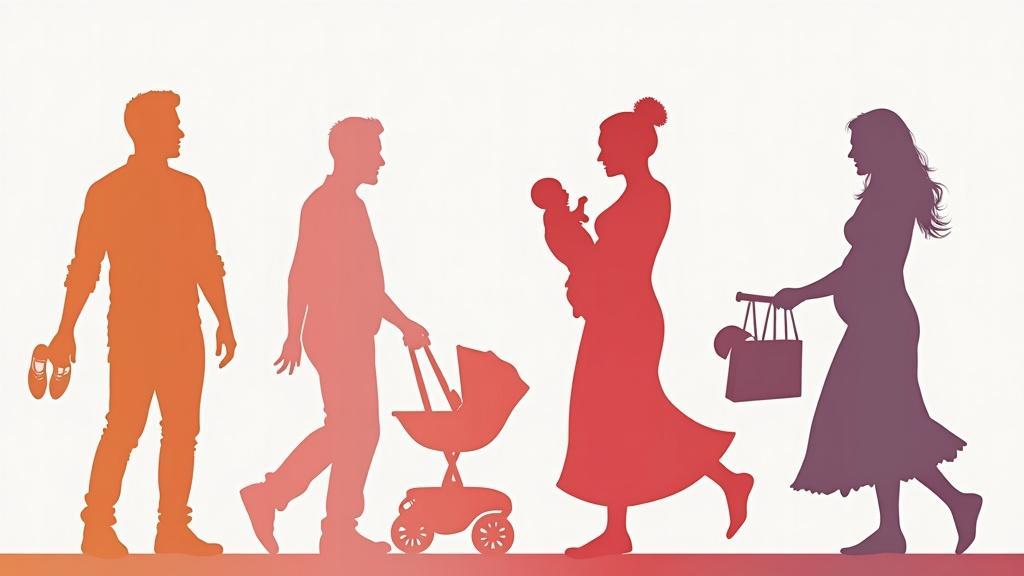The Trump Baby Bonus has ignited a spirited debate across America, highlighting a proposed $5,000 cash payment aimed at supporting new parents. This initiative seeks to counteract the alarming decline in the US birth rate, which has reached historic lows in recent years. Advocates for the bonus believe that this financial boost will significantly ease the economic burdens families face during the critical first year of a child’s life, potentially surpassing existing support like the federal child tax credit. By offering direct parenting financial support, the Trump campaign 2025 proposal hopes to incentivize childbirth and promote family growth in an era where many young adults cite financial concerns as a deterrent to starting a family. Understanding the implications of this radical proposal will be crucial as families prepare for what could be transformative policy changes in the near future.
The concept of a baby bonus, or a substantial cash incentive for new parents, is gaining traction in American political discourse. Known informally as the newborn cash gift, this initiative is designed to provide immediate financial assistance to families welcoming new children. This approach mirrors strategies employed by other nations to combat declining birth rates and improve family welfare. As discussions unfold on whether such a measure could succeed the traditional child tax credit, the focus remains on how this investment in future generations could reshape parenting financial support in the U.S. With the Trump campaign positioning this initiative within its 2025 platform, many are eager to learn how it would impact family planning and economic stability.
Understanding the Trump Baby Bonus: A Proposed $5,000 Cash Payment
The Trump Baby Bonus is a proposed initiative that aims to provide new parents with a one-time cash payment of $5,000 for each newborn. This significant financial support seems set to create a more favorable environment for childbirth by directly addressing one of the main concerns parents face today: the rising costs associated with raising children. By implementing this baby bonus, advocates argue that the economic pressures that often deter couples from having children could be alleviated, sparking a potential increase in the US birth rate.
Current conversations surrounding the baby bonus highlight the need for a system that better supports families during the early stages of parenthood. Many young adults cite financial constraints as a primary reason for delaying or forgoing starting a family altogether. If enacted, the Trump Baby Bonus would serve as a proactive measure to encourage family growth, providing significant upfront monetary resources to parents during this crucial and often costly first year.
Comparing the $5,000 Baby Bonus to Existing Child Tax Credits
When evaluating parenting financial support options, the proposed $5,000 Trump Baby Bonus stands out prominently in comparison to the federal Child Tax Credit. While the Child Tax Credit offers up to $2,000 annually per qualifying child, the baby bonus is structured as a one-time payment that would provide families with immediate financial relief after childbirth. This distinct approach positions the baby bonus as a much more substantial incentive for new parents in contrast to existing child tax benefits that typically require annual claims.
Moreover, the potential for the baby bonus to be fully refundable sets it apart from the Child Tax Credit, which is only partially refundable based on income levels. Under the proposed framework, even families without a tax liability could still benefit from the baby bonus, ensuring broader accessibility for all new parents, including those at lower income brackets. This difference highlights the baby bonus’s intent to directly address the burdens associated with bringing a new child into the world.
Addressing America’s Declining Birth Rate Through Financial Incentives
The United States has faced a notable decline in birth rates over the past decade, reaching one of the lowest levels in 2023 according to the CDC. As societal costs rise, many young Americans have expressed hesitance about starting families, citing factors such as high living expenses and insufficient parental support. The introduction of the Trump Baby Bonus aims to counteract these trends by providing a financial incentive that could encourage family growth and address the pressing economic realities faced by potential parents.
Supporters of the baby bonus argue that this kind of direct financial assistance is instrumental in stabilizing population trends, reducing parental economic stress, and promoting a culture that values childbirth. By acknowledging the economic factors at play, the proposal seeks to reframe childbearing as not just a personal choice but a matter of national importance that warrants government support and involvement.
Key Supporters of the Trump Baby Bonus Proposal
The Trump Baby Bonus has garnered support from various key players, including advisers from the Trump campaign and advocacy groups such as the America First Policy Institute. These supporters view the baby bonus as part of a broader strategy to implement pronatalist reforms aimed at reversing the declining birth rate, thereby enhancing the economic future of the nation. Their recognition of the issue underscores a community-wide commitment to addressing financial pressures on young families.
Additionally, conservative policy groups are rallying behind the baby bonus proposal, advocating for measures that re-align fiscal policy with family growth. Although no bill has yet been introduced in Congress, the idea is being championed as a potential cornerstone of the Trump campaign in 2025, signaling its importance on the political agenda for upcoming elections.
Comparative Insights: Baby Bonus vs. Other Countries’ Financial Support Systems
The introduction of the Trump Baby Bonus proposal is not without precedent in the global context, as many countries like Singapore, Canada, and Australia successfully implement similar financial support systems for families. These nations have recognized the value of providing direct cash incentives for childbirth, resulting in enhanced family support and increased birth rates. By looking to these models, the U.S. may find a pathway to effectively address its declining birth rate.
Unlike the traditional U.S. strategy that primarily focuses on tax credits for families, the baby bonus shifts towards a more direct monetary approach. Observing the successes and challenges faced by other countries can provide valuable insights for the implementation of the baby bonus in the U.S.—potentially leading to an effective support system that aligns with the evolving needs of American families.
Anticipating Legislative Changes: The Future of the Baby Bonus
The path forward for the Trump Baby Bonus proposal remains uncertain unless it transitions from a mere campaign slogan to concrete legislation. This potential shift hinges on public interest and political will, especially as midterm elections approach. If the proposal gains traction, it could initiate important discussions regarding family and financial support measures in Congress, where it might be evaluated alongside existing options like the Child Tax Credit.
Parents and expectant families are encouraged to stay informed as developments unfold regarding the baby bonus. Monitoring government announcements and political discussions will be essential in understanding how this proposal could reshape parenting financial support and impact family planning decisions moving forward.
Economic Implications of the Proposed Baby Bonus on Families
The economic implications of the proposed Trump Baby Bonus are significant for families grappling with the financial realities of bringing a child into their lives. This cash infusion directly addresses numerous costs associated with childbirth—such as medical expenses, childcare, and paternity leave—by empowering parents with immediate access to funds. In a landscape where many families are already feeling the strain of high living costs, such a bonus could offer a crucial financial cushion.
Additionally, the baby bonus could lead to increased consumer spending associated with childbirth, which may help stimulate local economies. When new parents have extra cash in hand, they are more likely to invest in baby-related essentials such as clothing, gear, and services, contributing to broader economic growth while simultaneously aiding in offsetting the costs related to raising children.
The Role of the Baby Bonus in the Broader Family Support Discussion
In the larger discussion of parenting financial support, the proposed Trump Baby Bonus occupies a critical space by prompting conversations about the efficacy of current child-related benefits. As stakeholders in the political arena begin to weigh the merits of the baby bonus against the existing Child Tax Credit, it raises vital questions about the direction of U.S. policy regarding family welfare. This proposal could serve as a catalyst for re-examining and revitalizing family support across various social and economic spectrums.
Furthermore, the baby bonus could inspire innovative policy reforms aimed at positively influencing parental decisions. By highlighting the financial support necessary to raise children, discussions around the baby bonus pave the way for broader initiatives that could enhance the overall wellbeing of families, ensuring that the economic challenges associated with parenting are no longer barriers to family growth.
Frequently Asked Questions
What is the Trump Baby Bonus and how does it work?
The Trump Baby Bonus is a proposed $5,000 cash payment for each newborn child, aimed at financially supporting new parents during the costly first year of childcare. It would likely be offered directly to parents or guardians as a one-time payment, with details on eligibility and application processes still to be determined.
How does the Trump Baby Bonus compare to the Child Tax Credit?
The Trump Baby Bonus provides a one-time payment of $5,000 per child, significantly higher than the Child Tax Credit, which offers up to $2,000 per child annually. The baby bonus is proposed to be fully refundable, potentially giving families quicker access to funds compared to the annual tax credit process.
Why is the Trump Baby Bonus being proposed now?
The Trump Baby Bonus proposal comes as a response to the declining US birth rate, with advocates suggesting that offering parenting financial support could incentivize childbirth and alleviate economic pressures faced by families, particularly those considering parenthood amid rising living costs.
Who are the main supporters of the Trump Baby Bonus?
The Trump Baby Bonus has garnered support from Trump campaign advisers, the America First Policy Institute, and various conservative groups advocating for pronatalist policies. These supporters argue that direct financial assistance is essential to bolster family growth and economic revival.
Is the Trump Baby Bonus similar to baby bonuses offered in other countries?
Yes, the Trump Baby Bonus is akin to baby bonus schemes in countries like Singapore, Canada, and Australia, where cash incentives for childbirth are common. The U.S. has predominantly used tax credits but is now reconsidering direct payments through this proposal.
When will the Trump Baby Bonus be officially implemented?
As of now, the Trump Baby Bonus remains a campaign proposal with no official legislation proposed yet. Its future will depend on its adoption as part of the 2025 campaign platform and potential legislative action following that.
What impact could the Trump Baby Bonus have on the US birth rate?
The Trump Baby Bonus is designed to combat declining birth rates by providing financial support to new parents, thereby reducing the economic strain of raising children. Supporters believe this could encourage more families to have children, potentially stabilizing population trends in the long term.
| Feature | Baby Bonus Proposal | Child Tax Credit (2025) |
|---|---|---|
| Amount per child | $5,000 (one-time) | Up to $2,000 annually |
| Refundable? | Likely fully refundable | Partially refundable |
| Income limits | TBD | Phased out above $200k/$400k |
| Claim process | TBD | Filed via IRS tax return |
| Payment timing | After childbirth | Annual (during tax season) |
Summary
The Trump Baby Bonus proposes a one-time $5,000 cash payment to new parents as a strategy to address the declining birth rate in America. This initiative, though not yet official policy, aims to provide substantial financial support for families during the critical first year after a child’s birth, thereby encouraging parents to have more children. Compared to the existing Child Tax Credit, the proposed bonus promises faster and more immediate assistance. As the 2025 election approaches, the Trump Baby Bonus may become a significant topic for discussion as it aligns with efforts to revive family and economic growth.



